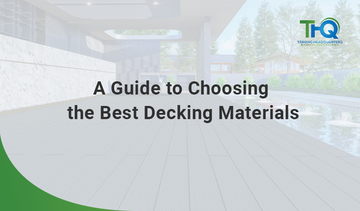Crafting your perfect deck can be challenging, particularly when it comes to choosing the right materials from the many options available. To make an informed decision and achieve the best results, consider the advantages of wall cladding. Just as cladding enhances building exteriors with its protective and aesthetic benefits, selecting the right deck materials can significantly impact the durability and appearance of your outdoor space.
We've put together this guide to help you make informed decisions and create a beautiful, durable deck that will last for years.
From wood varieties to composite materials, we’ll compare and contrast different options to help you choose what works best for your needs. Similarly, just as you should choose the right artificial grass for your outdoor space, selecting the ideal decking material is key to creating your dream deck. Let’s dive in and explore your options
Overview of common deck materials:
1. Natural wood
Crafting the perfect deck requires careful consideration of materials. There are many options available, each with its benefits and drawbacks.
Natural wood is a common material for decks, which offers a classic look and can be stained or painted to match your desired aesthetic. However, it may require more maintenance over time compared to other materials such as composite decking or PVC.
2. Composite decking
Wood has been a traditional choice for decks due to its natural beauty and affordability. However, with advancements in technology, composite decking has gained popularity as a low-maintenance alternative that mimics the look of real wood without all the upkeep.
It also resists mould, mildew, stains, scratches, and fading better than traditional wood decks. While initially more expensive than other materials upfront cost-wise, composite decking pays off in the long run with lower maintenance costs over time.
3. PVC decking
One common material used for decking is PVC or polyvinyl chloride. This type of decking offers a low-maintenance option as it does not require staining or sealing like wood decks do.
It also has excellent durability and can withstand harsh weather conditions without warping or rotting.
However, some may argue that PVC lacks the natural look and feel of traditional wood decks. Ultimately, when deciding on which material to use for your deck, consider factors such as maintenance requirements, durability, cost-effectiveness, and aesthetic appeal before making a decision.
4. Aluminum decking
Another common material used for decking is aluminium. This type of decking offers a sleek and modern look while also being durable and low maintenance. It is resistant to rust and rot, making it a great option for outdoor use.
Additionally, aluminium decking can be easily installed without any special tools or equipment needed. With all these advantages, it's no wonder why more homeowners are opting for this material when building their dream decks.
Pros and Crons of each type
When it comes to crafting your perfect deck, choosing the right materials is crucial. There are many common decking types available in the market today, each with its own set of pros and cons.
For example, wood decks offer a natural look and feel but require regular maintenance and can be prone to rotting or warping over time.
On the other hand, composite decks are low-maintenance and durable but may not have the same aesthetic appeal as wood.
It's important to carefully consider these factors before deciding on which type of decking material will best suit your needs for creating that dream outdoor space.
Considerations for selecting the best material
1. Climate and weather conditions
When it comes to crafting your perfect deck, choosing the right materials is crucial. Several considerations should be taken into account when selecting the best material for your deck. One of these factors is climate and weather conditions.
Depending on where you live, different types of materials may be more suitable for your deck to withstand harsh weather elements such as extreme heat or heavy rain. Investing in weather-resistant decking can ensure durability and longevity, making it essential to carefully research and compare different options before deciding on what material will work best for your specific location and needs.
2. Desired aesthetics and style
You want to choose a material that not only fits your budget and durability needs but also complements the overall look you're going for with your outdoor space.
Whether you prefer a classic wood finish or a more modern composite option, carefully considering these factors will help ensure that you end up with a beautiful and functional deck that meets all of your expectations.
3. Budget constraints
There are many factors to consider when deciding on the best material for your deck, including durability, maintenance requirements, and aesthetic appeal. However, one of the most important considerations is financial constraints.
To create a long-lasting and visually appealing deck while staying within your budget, you must strike a balance between quality and cost-effectiveness. With proper research and planning, you can select the best materials for your deck without breaking the bank.
4. Environmental impact
As more people become aware of their carbon footprint and strive for sustainability, it's critical to consider how our decisions affect the environment. By considering eco-friendly options such as recycled or sustainably sourced materials, we can create a beautiful outdoor space while reducing our environmental impact.
Selecting the proper materials is essential to building the ideal deck. Making a choice can be difficult because there are so many options. To help you make decisions, it's crucial to prioritize your needs and preferences in order of importance.
When choosing materials for your deck, take into account elements like cost, durability, upkeep requirements, and visual appeal. You can make sure you create a stunning and useful outdoor space that fulfils all of your unique needs and desires by taking the time to carefully consider these factors.
Factors influencing the durability of deck materials:
1. Resistance to moisture, rot, and insect damage
Several factors can affect the durability of your deck materials, but one of the most important is their resistance to moisture, rot, and insect damage. These factors can significantly impact the lifespan of your deck and should be carefully considered when selecting materials.
Pressure-treated wood, composite decking, and PVC decking are some popular decking options, each with varying levels of resistance to these damaging factors. To create a long-lasting and beautiful outdoor space for you and your family to enjoy, you must compare and contrast these options before deciding which will work best for your specific needs.
2. Longevity and warranty coverage
The longevity and warranty coverage of deck materials are two factors that can affect their durability. To ensure the long-term quality and functionality of your deck, it is crucial to take these factors into account when choosing the materials.
You can select the best materials for your outdoor space that will not only improve its aesthetic appeal but also withstand wear and tear over time by carefully comparing and contrasting various options. You can build a stunning and long-lasting deck with careful planning and study that will last for many years.
Comparison of maintenance requirements for different materials:
1. Cleaning and upkeep
Selecting the proper materials is essential to building the ideal deck. You require a material that needs little upkeep in addition to one that fits your budget and looks good. Examining a material's cleaning and maintenance needs is one way to compare them.
For instance, composite decking is easily cleaned with soap and water, but wood decks may need to be stained or sealed regularly to avoid rotting and warping. You can select the best material for your requirements and guarantee a durable, low-maintenance deck for many years to come by taking these factors into account.
2. Repairs and replacements
You want a material that not only suits your budget and looks good, but also needs minimal maintenance over time. When choosing a material, it's critical to weigh the pros and cons of each and compare maintenance needs.
Wood, for instance, might need more frequent repairs or replacements than composite decking, which lasts longer and requires less maintenance. You can ensure that your deck will continue to be attractive and useful for many years by taking these factors into account.
Cost breakdown for various deck materials:
1. Initial installation expenses
When making a choice, it's critical to take the cost distribution of different deck materials into account.
Which material will work best for your needs and budget will depend on several factors, including durability, upkeep requirements, and overall aesthetic appeal.
Initial installation costs can vary significantly depending on the material selected. You can create an outdoor space that is both beautiful and functional without going over budget if you carefully consider these factors.
2. Long-term maintenance costs
Not only do you want a beautiful and functional outdoor space, but you also want to consider the cost breakdown for various deck materials.
While some may be more expensive upfront, they could save you money in long-term maintenance costs.
For example, while wood decks may have a lower initial cost, they require regular staining or sealing which can add up over time. On the other hand, composite decking may have a higher upfront cost but requires little maintenance and lasts longer.
3. Value for money proposition
When it comes to building your ideal deck, selecting the right materials is critical. There are numerous options on the market, each with its own cost and value-for-money proposition.
For example, while wood is a less expensive option, it requires regular maintenance, whereas composite decking has a higher initial cost but offers long-term durability and low maintenance.
Before deciding which deck material will provide you with the best value for your money, you should conduct a cost analysis and weigh the pros and cons of each. After all, investing in high-quality materials now will save you time and money in the long run by eliminating the need for frequent repairs or replacements.
Tips for maximizing budget without compromising quality or longevity.
When it comes to crafting your perfect deck, choosing the best materials is crucial. Not only do you want a beautiful and functional outdoor space, but you also want it to last for years to come without breaking the bank.
Here are some tips for maximizing your budget while still ensuring quality and longevity in your deck materials:
1) Consider using composite decking instead of traditional wood, as it is more durable and requires less maintenance over time.
2) Shop around for deals on high-quality materials, and don't be afraid to negotiate or look at different suppliers.
3) Don't skimp on important structural elements like joists and beams, as these provide the foundation for your deck's stability.
Finally, always prioritize safety when choosing materials, as cheaper alternatives may not meet building codes or pose potential hazards in the future. With these tips in mind, you can design a beautiful and long-lasting deck that fits within your budget.
Environmental Impact and Sustainabilit
1. Environmental considerations associated with different materials:
Different materials have varying levels of sustainability and environmental friendliness. Some decking materials, for example, may require harmful chemicals during the sourcing and manufacturing processes, whereas others may be more sustainable and made from renewable resources.
Furthermore, taking into account the material's recyclability and biodegradability can help to reduce waste over time. Finally, considering each material's carbon footprint and ecological impact will help ensure that your dream deck doesn't compromise the health of the planet.
2. Strategies for selecting eco-friendly materials and minimizing environmental harm.
With a growing emphasis on sustainability and eco-friendliness, there are strategies for selecting materials that cause the least amount of harm to the environment while producing high-quality results.
There are numerous ways to create a beautiful and environmentally friendly outdoor space, including the use of recycled or reclaimed wood and low-maintenance composite decking options. By carefully selecting your materials, you can ensure that your dream deck not only meets your needs but also reflects your values.
Seeking Professional Guidance
When it comes to building your ideal deck, selecting the right materials is critical. There are several options available on the market, each with its own set of benefits and disadvantages. Before making a decision, conduct extensive research and take into account factors such as durability, maintenance, and cost.
However, if you're feeling overwhelmed or unsure about which materials will best suit your specific needs, don't be afraid to seek professional help. A contractor or home improvement expert can provide valuable insights and assist you in making an informed decision, resulting in a beautiful and long-lasting deck for your home. Don't be afraid to ask for assistance when necessary!
Conclusion
Finally, choosing the right materials for your deck is essential. Whether you opt for wood or composite decking, it's important to weigh the pros and cons to determine which option best meets your needs and budget. At THQ (Trading Headquarters), we offer a wide range of decking materials, allowing you to find the perfect fit for your project.
Remember to consider maintenance requirements, durability, and overall aesthetic appeal. By comparing and contrasting various options available at THQ, you can ensure that your deck will be both functional and aesthetically pleasing for years to come.






